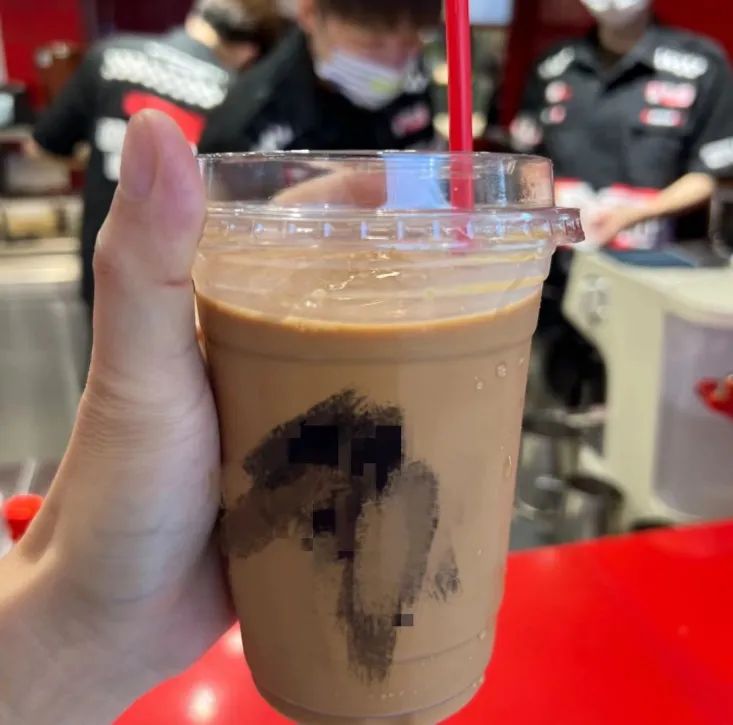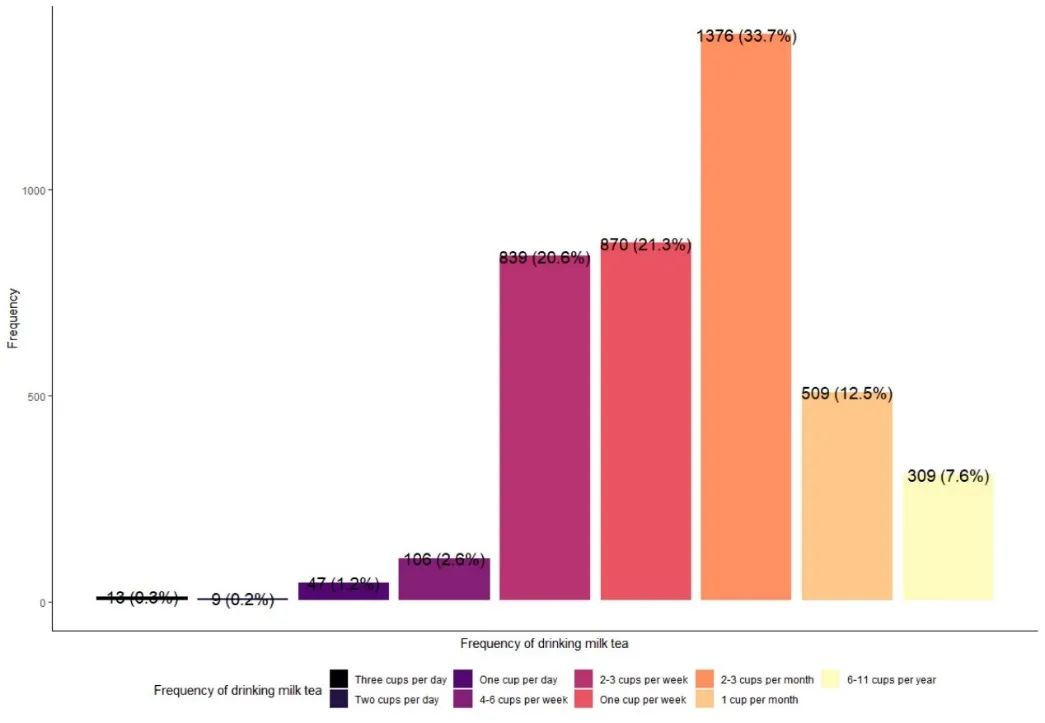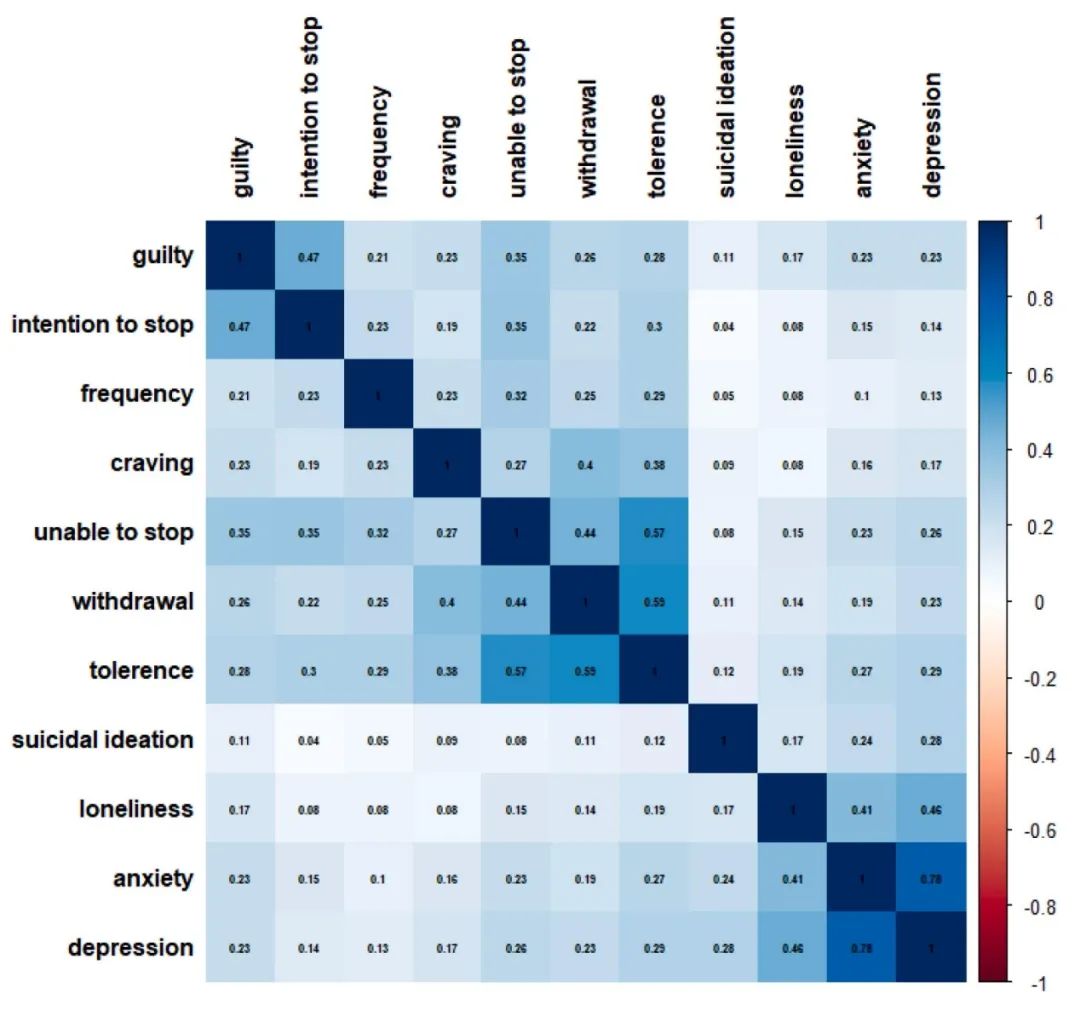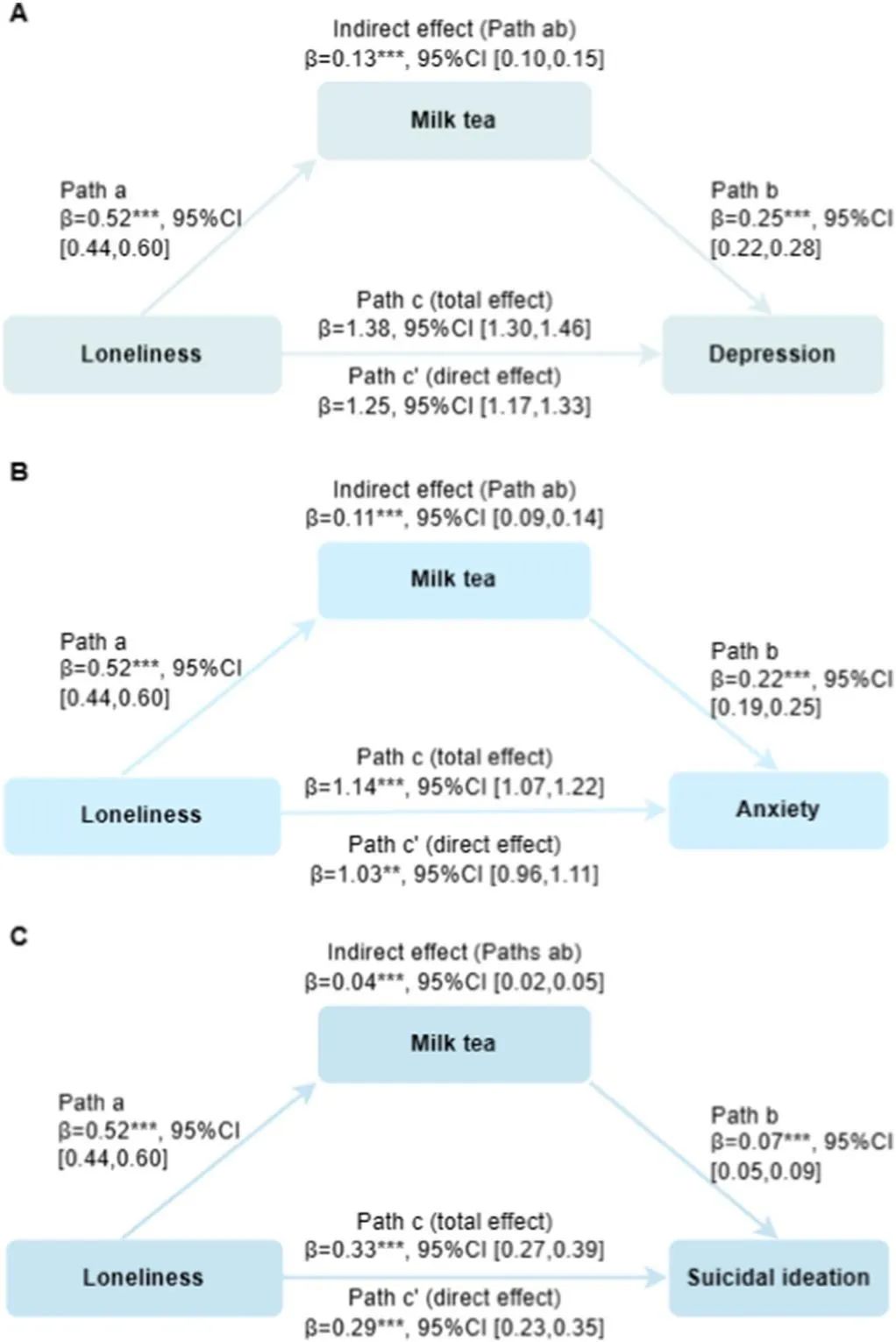Milk tea, with its rich variety of flavors, has successfully attracted consumers of all ages and cultural backgrounds worldwide. Through carefully designed marketing strategies and easy accessibility, this beverage has not only become the preferred choice for socializing and relaxation among young people but has gradually evolved into a global phenomenon.
Whether as a “comfort food” or a fashion statement, milk tea, with its unique charm, has become one of the most popular drinks of contemporary times.

Image source: Author
A research team from Tsinghua University and the Central University of Finance and Economics conducted a survey of 5,281 university students in Beijing,finding that the phenomenon of milk tea addiction does exist and is associated with psychological issues such as depression and anxiety.
Is the phenomenon of milk tea addiction
really present?
The researchers first utilized the Likert Scale (Likert Scale) to investigate the frequency of milk tea consumption among these young people over the past year. The Likert Scale is a questionnaire tool used to assess an individual’s attitude towards specific issues or viewpoints, typically consisting of a series of statements and a scoring range from “strongly disagree” to “strongly agree.” The coding was as follows: 1=3 cups daily, 2=2 cups daily, 3=1 cup daily, 4=4-6 cups weekly, 5=2-3 cups weekly, 6=1 cup weekly, 7=2-3 cups monthly, 8=1 cup monthly, 9=6-11 cups yearly, 10=almost never drink milk tea. By collecting and analyzing this data, the researchers aimed to quantify and understand the general perceptions of the participants.

Frequency of milk tea consumption among teenagers. Image source: Reference [1]
Almost half of the respondents reported that they drink at least one cup of milk tea per week. Among them, 2.6% of teenagers drink 4 to 6 cups of milk tea weekly, and 20.6% drink 2 to 3 cups weekly.This finding raises alarms for everyone, as milk tea is popular not only in China but also worldwide.
Next, the researchers referred to the Diagnostic and Statistical Manual of Mental Disorders (DSM) published by the American Psychiatric Association, which is globally recognized as the primary authoritative guide for diagnosing mental disorders. Milk tea addiction could potentially include symptoms ranging from “frequency of milk tea consumption,” “persistent cravings/dependence symptoms,” “feelings of guilt,” to “withdrawal symptoms,” “tolerance symptoms,” “inability to stop,” and “intention to stop.” They proposed that milk tea addiction may encompass the following six phenomena:
(1) The amount and duration of milk tea consumption exceed expectations;
(2) Multiple attempts to quit milk tea but failed;
(3) Tendency to drink milk tea when feeling down;
(4) Continuing to consume milk tea despite knowing the adverse consequences;
(5) Developing tolerance, needing to increase milk tea consumption to achieve the desired pleasure;
(6) Experiencing withdrawal symptoms after reducing or stopping milk tea consumption.
According to the Alcohol Use Disorders Identification Test (AUDIT), the total score indicates a higher likelihood of milk tea addiction. Although the milk tea addiction scale was adapted from the caffeine addiction scale and the most commonly used alcohol addiction scale, the researchers conducted reliability and validity tests to ensure its credibility.
By employing this recognized addiction scale, the researchers found that some young individuals exhibited signs of addiction.
This study is the first to explore the potential addictive nature of milk tea consumption and its impact on the mental health of adolescents. The results indicate that milk tea consumption may trigger addiction symptoms, including frequency of consumption, dependence/cravings, withdrawal desires, inability to quit, tolerance, and feelings of guilt.
Does milk tea addiction
affect mental health?
The researchers further investigated feelings of loneliness, symptoms of depression, anxiety symptoms, and even suicidal thoughts among the youth population through a questionnaire,finding a significant correlation between milk tea addiction and various adverse mental health conditions.
Specifically, there is a positive correlation between loneliness and milk tea addiction, with a correlation coefficient of r=0.19, p<0.001. This means that individuals who feel lonelier are more likely to become addicted to milk tea. Additionally, milk tea addiction shows a moderate positive correlation with symptoms of depression (r=0.31, p<0.001) and anxiety symptoms (r=0.28, p<0.001). These data suggest that milk tea addiction may be an important indicator of mental health issues. This finding is concerning and provides mental health experts with a new perspective: dietary habits and consumption behaviors may be significant dimensions for understanding mental health problems.

The correlation between milk tea addiction and mental health outcomes. Image source: Reference [1]
To further confirm the strong association between milk tea addiction and depression, anxiety, and suicidal thoughts, the researchers employed a General Linear Model (GLM). The results of the model indicated that higher levels of milk tea addiction corresponded to increased risks of depression (b=0.24, p<0.001), anxiety (b=0.21, p<0.001), and suicidal thoughts (b=0.06, p<0.001). This further supports the notion that milk tea addiction is significantly associated with adverse mental health conditions. The application of this mathematical model enhances the credibility of the research findings and allows researchers to more accurately predict the relationships between different variables. Notably, after controlling for other factors that may influence the results, such as age, gender, income, and loneliness, the association becomes even clearer.
The analysis of mediating effects further enhances the explanatory power of this series of findings. By using milk tea addiction as a mediating variable, the indirect effects of loneliness on mental health conditions were analyzed. The results showed a significant positive correlation between loneliness and milk tea addiction, while milk tea addiction also exhibited a significant positive correlation with depression, anxiety, and suicidal thoughts, indicating that milk tea addiction plays a mediating role between loneliness and adverse mental health conditions. It reveals thatmilk tea addiction is not only a significant indicator of the relationship between loneliness and adverse mental health conditions but also plays a mediating role.

The indirect impact of milk tea addiction on loneliness and mental health outcomes. Image source: Reference [3]
This means that loneliness may indirectly increase the risk of depression, anxiety, and suicidal thoughts by increasing the frequency of milk tea consumption. This perspective provides a potential new direction for mental health interventions, suggesting that reducing milk tea addiction may indirectly improve mental health.
-
The association between milk tea addiction and poor mental health: A possible explanation
The previous discussion explored the association between milk tea addiction and poor mental health conditions, covering aspects such as depression, anxiety, and suicidal thoughts. So, how might milk tea addiction lead to poor mental health?
One plausible explanation is thatmilk tea typically contains high levels of sugar. Early studies have revealed that excessive sugar intake may lead to increased cortisol levels, thereby disrupting the normal functioning of the hypothalamic-pituitary-adrenal (HPA) axis.The HPA axis is a core hormonal system responsible for regulating the body’s response to stress and significantly influences emotions and behavior. When this system is imbalanced, an individual’s emotional regulation may be impaired, increasing the risk of depression, anxiety, and suicidal thoughts. In other words, frequent consumption of milk tea may cause an imbalance in the HPA axis due to its high sugar content, leading to mental health issues.
In 2022, researchers from Anhui Medical University conducted animal experiments using mice to examine the direct effects of long-term milk tea consumption. The results showed anxiety, depressive-like behaviors, and cognitive dysfunction, but no evidence was found that drinking milk tea could lead to addictive behaviors in mice. This may be because mice lack compensatory mechanisms similar to humans, which could lead to addictive responses to milk tea. Therefore, when interpreting animal research results related to human behavior, these differences must be considered.
Why do women
prefer drinking milk tea more?
Interestingly, the phenomenon of milk tea addiction is more pronounced among women, which may be attributed to various factors.
Multiple studies have shown thatwomen generally prefer sweet flavors, while men may lean towards salty or spicy foods.This taste preference may be influenced by both biological and cultural factors, making women more susceptible to the appeal of high-sugar milk tea.
Additionally, women may tend to use sweet foods as emotional regulation tools, using food to cope with stress or negative emotions. When facing emotional stress, women may rely more on food, especially sweet foods, as a means of relief. Therefore, milk tea may be viewed as a “stress reliever,” helping women cope with daily stress and emotional fluctuations.
The preference of women for milk tea may result from a combination of factors, which also explains why women are the primary consumers of milk tea and are more likely to experience addiction-related phenomena.
Conclusion
Excessive consumption of milk tea may lead to addictive behaviors, which could be associated with mental health issues such as depression, anxiety, and suicidal thoughts. Furthermore, as a compensatory strategy for emotional regulation, milk tea addiction may mediate the relationship between loneliness and mental health issues.
It is important to remind everyone thatthe situations discussed in this article are based on the premise of milk tea addiction, and those who occasionally order a cup should not be overly concerned.However, it is undeniable that commercially available milk tea is not a very healthy beverage in many aspects, so it is best to consume it in moderation.
References
[1] Qu, Diyang, et al. “New form of addiction: An emerging hazardous addiction problem of milk tea among youths.” Journal of Affective Disorders 341 (2023): 26-34.
[2] Wu, Jiayi. “What Makes Bubble Tea Popular? Interaction between Chinese and British Tea Culture.” The Frontiers of Society, Science and Technology 2.16 (2020): 97-102.
[3] American Psychiatric Association, D. S. M. T. F., and American Psychiatric Association. Diagnostic and statistical manual of mental disorders: DSM-5. Vol. 5. No. 5. Washington, DC: American psychiatric association, 2013.
[4] DiNicolantonio, James J., et al. “Fructose-induced inflammation and increased cortisol: A new mechanism for how sugar induces visceral adiposity.” Progress in cardiovascular diseases 61.1 (2018): 3-9.
[5] Asarnow, Lauren D. “Depression and sleep: what has the treatment research revealed and could the HPA axis be a potential mechanism?.” Current opinion in psychology 34 (2020): 112-116.
[6] Adinoff, Bryon, et al. “Suppression of the HPA axis stress‐response: implications for relapse.” Alcoholism: Clinical and Experimental Research 29.7 (2005): 1351-1355.
[7] Braquehais, María Dolores, et al. “Hypothalamic-pituitary-adrenal axis dysfunction as a neurobiological correlate of emotion dysregulation in adolescent suicide.” World Journal of Pediatrics 8 (2012): 197-206.
[8] Faravelli, Carlo, et al. “The role of life events and HPA axis in anxiety disorders: a review.” Current pharmaceutical design 18.35 (2012): 5663.
[9] Yao, Yitan, et al. “Effects of chronic bubble tea administration on behavior and cognition in C57BL/6 mice.” Frontiers in Psychiatry 13 (2022): 1044052.
[10] Chao A M, Grilo C M, Sinha R. Food cravings, binge eating, and eating disorder psychopathology: Exploring the moderating roles of gender and race[J]. Eating behaviors, 2016, 21: 41-47.
[11] Zellner D A, Garriga-Trillo A, Rohm E, et al. Food liking and craving: A cross-cultural approach[J]. Appetite, 1999, 33(1): 61-70.
[12] Kampov-Polevoy A B, Alterman A, Khalitov E, et al. Sweet preference predicts mood altering effect of and impaired control over eating sweet foods[J]. Eating behaviors, 2006, 7(3): 181-187.
[13] Zellner D A, Loaiza S, Gonzalez Z, et al. Food selection changes under stress[J]. Physiology & behavior, 2006, 87(4): 789-793.
Planning and Production
Author丨Denovo Science Popularization Author
Reviewed by丨Ruan Guangfeng Deputy Director of the Center for Food and Health Information Exchange
Planned by丨Ding Zai
Edited by丨Ding Zai
Reviewed by丨Xu Lai Lin Lin
Related Articles
1. Latest Research: Garlic Really Can Lower Blood Lipids and Blood Sugar, But the Premise Is…
2. Sleeping One More Hour a Day Equals Eating Three Fewer Bowls of Rice?! The Secret to “Lying Thin” Is Here→
3. The Debate Over Children Riding Bicycles: Is It Safe for Kids to Ride on the Road?
4. Four Abnormalities During Sleep That You Don’t Need to Worry About; Sleep Quality Is Fine!
5. Five Habits That Your Stomach Fears; Many People Do This Almost Every Day Without Knowing!
The cover image and images in this article are from copyright libraries.
Reproducing may lead to copyright disputes; for original text and images, please reply “Reproduce” in the background.

Light Up “Looking”
Let’s Gain Knowledge Together!
